Is Ha Long Bay Worth Visiting? An Honest Assessment (2025 Guide)
If you're planning a trip to Vietnam, you've undoubtedly come across stunning images of Ha Long Bay with its emerald waters and towering limestone karsts. As one of Vietnam's most iconic destinations and a UNESCO World Heritage Site, Ha Long Bay appears on countless "must-visit" lists. But in an age of overtourism and sometimes exaggerated marketing, a fundamental question arises: is Ha Long Bay truly worth visiting?
This comprehensive guide examines the genuine appeal of Ha Long Bay while honestly addressing potential drawbacks, helping you make an informed decision about including this famous destination in your Vietnam itinerary.
The Undeniable Magic: Why Ha Long Bay Captivates Travelers
A Geological Wonder Millions of Years in the Making
Ha Long Bay's primary allure lies in its breathtaking natural landscape. The bay features approximately 2,000 limestone islands and islets that emerge dramatically from the Gulf of Tonkin. These karst formations are the result of millions of years of chemical reactions between limestone and dripping water, creating an otherworldly seascape unlike anywhere else on Earth.
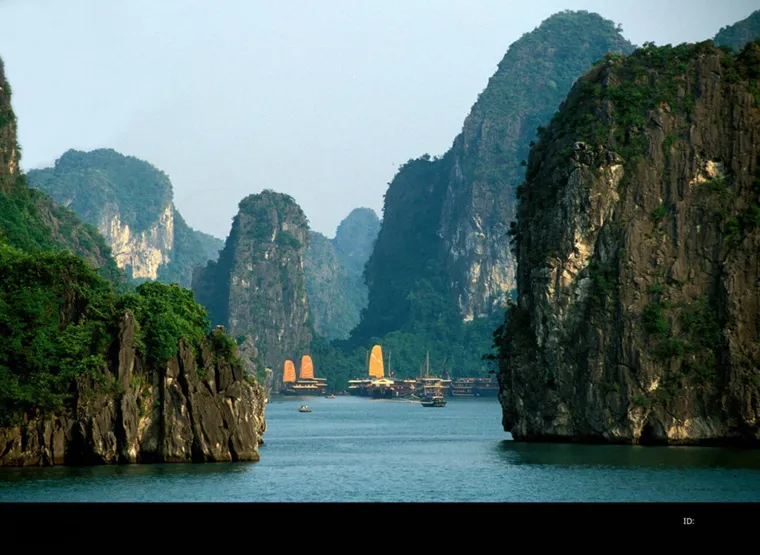
Ha Long Bay is a breathtaking UNESCO World Heritage Site - Photo Source: alamy
What makes Ha Long Bay truly special is its dual UNESCO World Heritage recognition – first for its outstanding aesthetic value, and later for its geological and geomorphological significance. This double endorsement underscores the bay's exceptional universal importance and unique character.
The dramatic karst landscape is enhanced by the thick jungle growth that crowns many island summits, creating a vivid tapestry of green against gray stone and emerald waters. The result is a natural masterpiece of breathtaking proportion that photographs simply cannot fully capture.
A Living Ecosystem Rich in Biodiversity
Beyond its geological significance, Ha Long Bay hosts a surprisingly rich ecosystem. The area encompasses diverse habitats including mangrove forests, coral reefs, and sea grass beds that support a wide variety of marine life. Nearly 60 endemic species make their home in these waters, alongside 14 endemic floral species found on the limestone islands.
The bay's caves and grottos add another dimension to its ecological tapestry. Almost 60 picturesque caves dot the landscape, with 19 currently open for tourist exploration. These natural formations showcase stunning stalactites and stalagmites created through centuries of mineral deposits.
Cultural Heritage and Human Connection
Ha Long Bay isn't just a natural wonder – it's also home to fascinating cultural heritage. The ancient floating village of Cua Van offers insight into the unique way of life adapted to the marine environment. Archaeological evidence suggests human settlements in the area dating back to prehistoric times, adding historical depth to the bay's already impressive credentials.
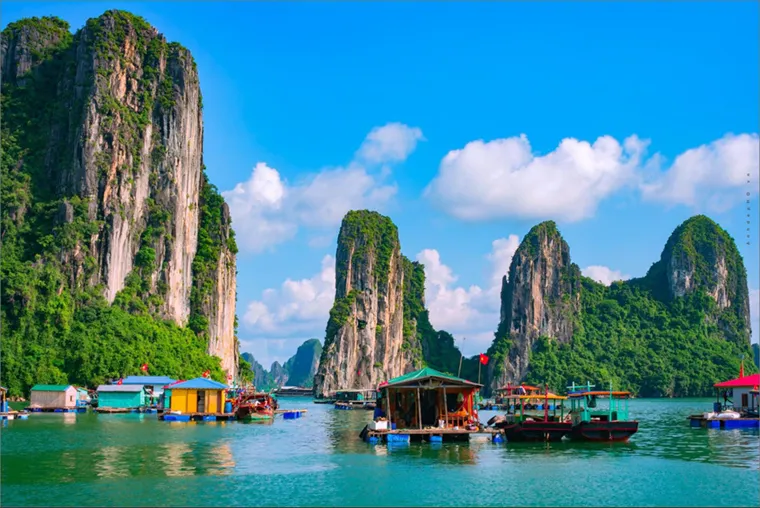
Ha Long Bay’s floating villages and archaeological sites showcase a deep cultural history of human adaptation to its marine environment - Photo Source: anhdephd.vn
The floating fishing villages represent centuries of human adaptation to this spectacular marine environment. Though fewer families live permanently on the water today due to government relocation programs, these villages remain important cultural landmarks where visitors can witness traditional fishing methods and lifestyles.
Experiences That Make Ha Long Bay Worth the Visit
Cruise Adventures: The Essential Ha Long Experience
The quintessential Ha Long Bay experience involves exploring its waters on a traditional wooden junk boat or a modern cruise vessel. Options range from half-day excursions to multi-day journeys, catering to different preferences and budgets.
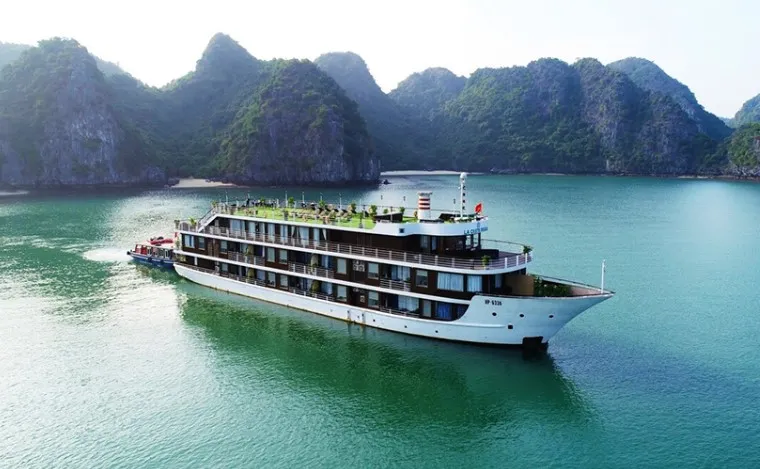
Exploring Ha Long Bay by cruise, especially an overnight stay - Photo Source: Facebook Du Lịch Hạ Long
Overnight cruises offer the most immersive experience, allowing you to witness both sunset and sunrise over the karst landscape. Many cruises include stops at major attractions, kayaking opportunities, swimming breaks, and meals featuring fresh local seafood. Waking up surrounded by the misty karsts as the morning sun illuminates the landscape is a truly magical experience that many visitors consider worth the trip alone.
Hidden Grottos and Magnificent Caves
Among Ha Long Bay's most captivating features are its numerous caves, each with distinct characteristics:
-
Sung Sot Cave (Surprise Cave): The largest and most popular cave in Ha Long Bay, featuring enormous chambers filled with impressive stalactite and stalagmite formations illuminated by colorful lights.
-
Thien Cung Cave (Heavenly Palace Cave): Known for its intricate limestone formations that resemble mythical creatures and palaces.
-
Dau Go Cave (Wooden Stakes Cave): A historically significant cave with connections to Vietnam's resistance against Mongol invasions in the 13th century.
-
Luon Cave: A unique water-level cave that visitors can access by kayak or small bamboo boat through a natural limestone archway, leading to a hidden lagoon where monkeys are often spotted.
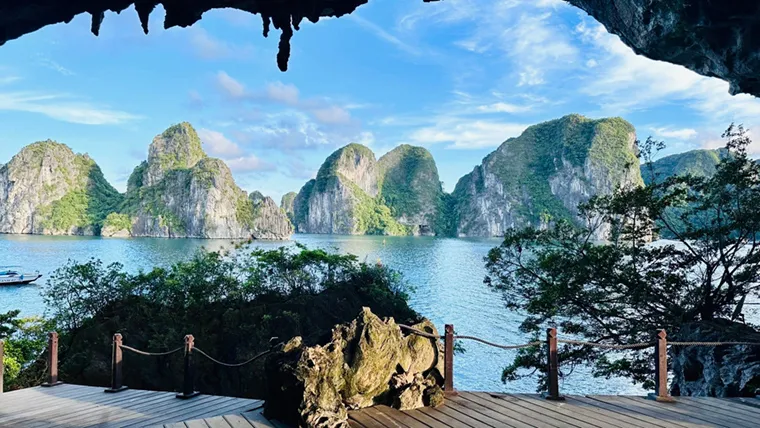
Ha Long Bay is home to stunning caves with unique formations, from the vast Sung Sot Cave to the historically significant Dau Go Cave - Photo Source: thanhnien.vn
These natural wonders offer a glimpse into the geological processes that have shaped the region over millions of years, with each cave presenting its own distinct atmosphere and formations.
Water-Based Activities and Island Exploration
The calm, protected waters of Ha Long Bay provide ideal conditions for various activities:
-
Kayaking: Paddle through hidden lagoons, into small caves, and around karst formations for a more intimate experience of the bay's beauty.
Swimming: Nearly 200 beaches nestle at the bases of limestone islands, offering refreshing swimming opportunities in the emerald waters. -
Island Hiking: Ti Top Island provides a steep climb to a summit offering panoramic views of the bay, while other islands feature trails through lush vegetation.
-
Fishing Village Visits: Traditional bamboo boats take visitors through floating communities where generations of families have lived on the water.
These activities allow travelers to engage with the bay's natural beauty from different perspectives, creating a multi-dimensional experience that goes beyond simple sightseeing.
The Honest Truth: Potential Drawbacks of Visiting Ha Long Bay
While Ha Long Bay's beauty is undeniable, several factors might impact your experience and should be considered when deciding if it's worth visiting.
Overtourism and Crowding Concerns
Ha Long Bay's popularity has led to significant tourism pressure. During peak seasons, popular sites can become crowded, potentially diminishing the sense of tranquility and natural wonder. Some visitors report feeling like they're on a "tourism conveyor belt," rushed through attractions alongside numerous other boats.
The bay receives millions of visitors annually, and the concentration of tourist boats in popular areas can create a sense of congestion, particularly around major attractions like Sung Sot Cave and Ti Top Island.
Environmental Challenges
Tourism's environmental impact presents another concern. Reports of pollution, including garbage and plastic waste in the water, have surfaced in recent years. Some visitors note that pollution has detracted from their overall experience.
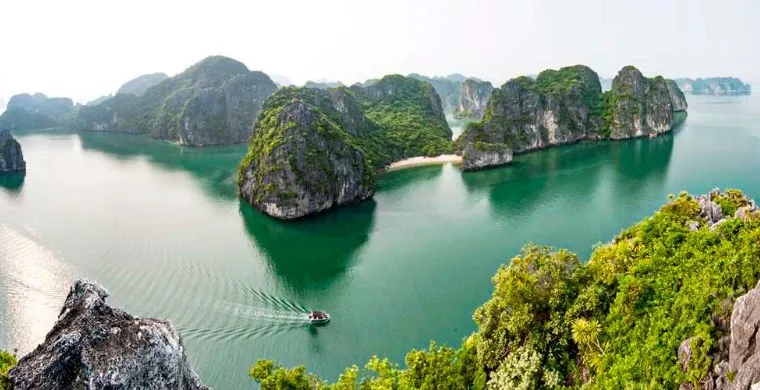
Pollution from tourism, including plastic waste and poor waste management, has negatively impacted the bay’s natural beauty - Photo Source: Facebook Du Lịch Hạ Long
Issues with waste management from both local communities and tourist operations contribute to these problems. Food waste and plastic pollution from the cruise industry have been specifically highlighted as environmental challenges facing Ha Long Bay.
Variable Quality of Tours and Services
The quality and value of tours and services can vary significantly. Some visitors report disappointment with overpriced experiences, poorly maintained boats, or service quality that doesn't match expectations based on marketing or price point.
Weather conditions also affect the experience, with fog and rain potentially obscuring views during certain times of the year. The possibility of booking an expensive cruise only to have scenery obscured by fog represents a risk, particularly during the winter months.
Making the Most of Your Ha Long Bay Visit: Practical Tips
If you decide Ha Long Bay is worth visiting despite potential drawbacks, these strategies can help maximize your experience:
Timing Your Visit Strategically
The best times to visit Ha Long Bay are during the shoulder seasons:
-
Spring (March to May): Pleasant temperatures (18-24°C/64-75°F), relatively low rainfall, and lush vegetation make this an ideal time. The landscape appears vibrant with flowers and active wildlife - perfect for outdoor excursions or joining Halong's cooking class to learn how to prepare local delicacies using fresh regional ingredients.
-
Fall (September to November): Another excellent period with comfortable temperatures (22-25°C/72-77°F), decreased humidity, and clear skies providing optimal visibility for photography.
Summer (June to August) brings hot, humid weather with temperatures reaching 35°C/95°F and the highest rainfall amounts, while winter (December to February) can be cool with temperatures as low as 12°C/54°F and foggy conditions that may limit visibility.
Choosing the Right Cruise Experience
Research thoroughly and book cruises from reputable operators with consistent positive reviews. Consider:
-
Tour Duration: While day trips offer a glimpse of the highlights, overnight cruises provide a more comprehensive, less rushed experience with opportunities to see the bay during different lighting conditions.
-
Boat Size: Smaller boats can access narrower passages and provide a more intimate experience, while larger vessels typically offer more amenities and stability.
-
Itinerary: Some cruises focus on the more crowded central Ha Long Bay area, while others explore less-visited regions like Bai Tu Long Bay or Lan Ha Bay, which offer similar limestone karst landscapes with fewer tourists.
-
Included Activities: Look for cruises that offer kayaking, cave exploration, beach stops, and cultural interactions for a well-rounded experience.
Carefully reading reviews from previous travelers can help identify operators who maintain their vessels well and provide quality service.
Exploring Alternative Bay Options
For those concerned about overtourism in Ha Long Bay, consider these alternatives that offer similar landscapes with fewer crowds:
-
Bai Tu Long Bay: Adjacent to Ha Long Bay and featuring the same stunning limestone karst formations but with significantly fewer tourists. Many cruises now focus exclusively on this area, offering a more serene experience.
-
Lan Ha Bay: Located south of Ha Long Bay near Cat Ba Island, this area boasts similar geological features along with beautiful beaches and floating villages, yet receives a fraction of Ha Long's visitors.
These alternatives provide the iconic karst landscape experience while potentially avoiding some of the drawbacks associated with Ha Long Bay's popularity.
Responsible Tourism Practices
Help preserve Ha Long Bay's beauty by practicing responsible tourism:
-
Choose tour operators with clear environmental policies and waste management practices
-
Avoid single-use plastics during your visit
-
Never throw anything overboard from cruise ships
-
Respect marine life and coral reefs during swimming and kayaking activities
-
Support local communities through ethical purchases and cultural engagement
These small actions collectively contribute to more sustainable tourism that can help preserve Ha Long Bay for future generations.
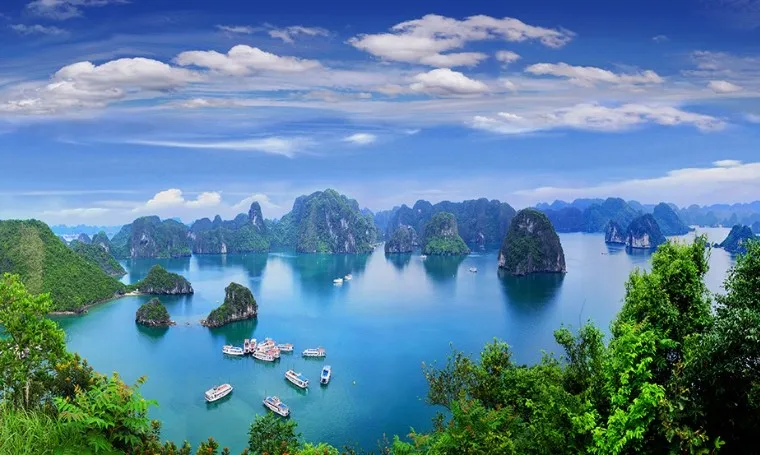
Spring (March–May) and Fall (September–November) offer the best weather, while summer is hot and rainy, and winter can be cool and foggy - Photo Source: Fanpage Du Lịch Hạ Long
Ha Long Bay vs. Lan Ha Bay: A Comparative Overview
For travelers weighing their options, this comparison highlights key differences between Ha Long Bay and the less crowded Lan Ha Bay alternative:
|
Feature |
Ha Long Bay |
Lan Ha Bay |
|
Location/Access |
Easier to reach from Hanoi |
Closer to Cat Bi Airport, more complex from Hanoi |
|
Scenery |
Over 60 limestone caves, diverse ecosystems |
Untouched beauty, beaches on Cat Ba Island |
|
Activities/Attractions |
Popular caves, islands, numerous cruises |
Quieter atmosphere, fewer visitors, Dark & Light Cave |
|
Crowds |
Millions of visitors annually, can be crowded |
Significantly less crowded, more pristine |
|
Cruising Options |
Over 200 options (budget to luxury) |
Fewer options but growing |
|
Approximate Costs |
Day tour: 250k VND |
Day tour: 50k-80k VND + 60k VND entrance fee |
This comparison suggests that while Ha Long Bay offers convenience and abundant options, Lan Ha Bay might provide a more peaceful experience with similar natural beauty at potentially lower costs.
So, Is Ha Long Bay Worth Visiting? The Verdict
The answer to whether Ha Long Bay is worth visiting ultimately depends on your travel preferences, expectations, and approach.
Yes, Ha Long Bay is worth visiting if:
-
You appreciate extraordinary natural landscapes and geological wonders
-
You're willing to research and select quality cruise operators
-
You can visit during shoulder seasons to avoid peak crowds
-
You understand that some areas may be busier than the idyllic photos suggest
-
You're interested in experiencing one of Vietnam's most iconic destinations
-
You’re excited to try unique local activities like Squid fishing in Ha Long at night or Kayaking in Ha Long Bay through hidden lagoons and limestone caves
Ha Long Bay might not be worth it if:
-
You're seeking a completely unspoiled, tourist-free natural experience
-
You're traveling during peak season and have limited flexibility
-
Environmental concerns are a top priority in your travel decisions
-
You have very limited time and can only do a rushed day trip
-
You're working with a tight budget that doesn't allow for quality cruises
For most travelers, the unique beauty of Ha Long Bay's limestone karst landscape and the cultural experiences available make it worth visiting despite potential drawbacks. The key is managing expectations, choosing the right timing and operators, and potentially considering less crowded alternatives like Bai Tu Long Bay or Lan Ha Bay that offer similar natural wonders.
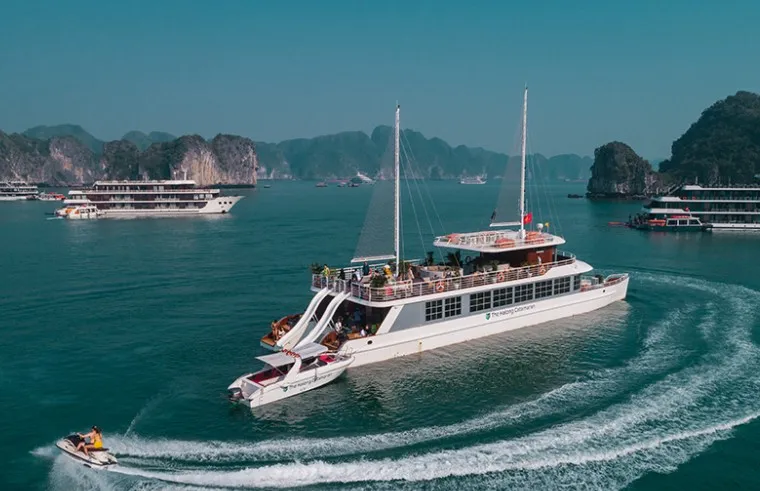
The breathtaking beauty and cultural heritage of Ha Long Bay make it a must-see for most travelers - Photo Source: Fanpage Du Lịch Hạ Long
When approached with the right preparation and mindset, Ha Long Bay still delivers an experience that justifies its global reputation as one of Vietnam's most remarkable natural treasures.
Final Thoughts: Making Your Decision
Whatever you decide, remember that Vietnam offers numerous incredible destinations beyond Ha Long Bay. If you choose to skip it, places like Ninh Binh (often called "Ha Long Bay on land"), Phong Nha's spectacular caves, or the terraced rice fields of Sapa provide equally memorable natural landscapes.
If you do visit Ha Long Bay, approach it with realistic expectations. Understand that you'll likely be sharing the experience with other tourists, but with proper planning, you can still find moments of tranquility and wonder amid one of nature's most remarkable limestone landscapes.
The enduring allure of Ha Long Bay's emerald waters and towering karsts continues to captivate travelers from around the world. Whether you deem it worth visiting depends largely on your own travel philosophy, but few dispute the raw natural beauty that has made this bay one of Vietnam's most celebrated natural wonders.
With a well-planned itinerary, budget-friendly options, and an open mind to meeting new people, your solo journey will be both fulfilling and exciting. Let Joytime be your trusted companion, providing essential travel gear to ensure comfort, safety, and convenience throughout your trip. An incredible solo adventure awaits—pack your bags and explore Hanoi with confidence!
|
Joytime Travel Agency - Travel JOY, TIMEless Vietnam Follow us for travel tips, local insights, and exclusive offers:
|

Danish Nguyen
Danish Nguyen is a renowned travel blogger in Vietnam with over 5 years of experience sharing unique travel experiences. With a passion for exploring new places, Danish captures incredible moments and provides readers with valuable tips to discover the beauty of his homeland.


















